By ROBERT H. REID
Associated Press Writer
BAGHDAD (AP) - The Iraq war enters year five with U.S. troops working to secure towns and neighborhoods, build up Iraqi's own police and army, and cultivate Iraqi community leaders to shore up grass-roots support for a post-Saddam Hussein government.
That sounds a lot like what the Americans say they have been trying to do almost since troops crossed the border in the spring of 2003. Repeated efforts have come up short.
This time, however, U.S. officials insist they're going to do it right.
Many officers and senior noncommissioned officers are now in their third tour and say they've learned from experience. That includes the overall commander, Gen. David Petraeus. He has revamped the counterinsurgency strategy, designed to win back not only the turf but public support.
Although never acknowledged publicly, the strategy switch also includes a clear sign that the old U.S. plan to hand over security to Iraqi forces quickly - a mission Petraeus spearheaded two years ago - has failed. U.S. troops are no longer taking a back seat. They're back behind the wheel - for as long as Congress and the
U.S. public will let them.
What remains unclear is how long it will take under the new strategy to achieve results - and whether the 21,500 additional combat troops being sent to Iraq will be enough to get the job done.
U.S. officers say they have about six to nine months to show results in the fight against Sunni insurgents, al-Qaida extremists, Shiite militias and sectarian death squads - and this may be their last chance. Opposition to the war within the United States could make it politically untenable to continue the mission in the run-up to the 2008 U.S. presidential election.
Much of the new strategy looks like the old - armed sweeps through contested areas to kill and capture as many extremists as possible, then install an Iraqi security force to make sure the gunmen don't come back.
This time, however, the Americans plan to stay on after the fighting, maintaining a residual force in the communities to work with Iraqi soldiers and police. As security improves, U.S. and Iraqi civilian authorities will try to restore public services, open banks and revive local economies.
Already, U.S. troops are setting up security posts inside Baghdad neighborhoods once racked by Shiite-Sunni fighting. To the west, the military is recruiting Sunni clans to try to challenge al-Qaida and other extremist groups for the loyalty of Sunnis in Anbar province.
Implementing the new strategy requires fine-tuning because the character of the war varies with the territory. In Baghdad and surrounding areas, the focus is on calming the Shiite-Sunni sectarian power struggle, in which civilians are the main target.
To the west, where few Shiites live, the fight is between Sunni insurgents and the U.S.-Iraqi force, which now includes Sunni clans that back the government. In the north, the struggle between Kurds, Arabs and Turkomen adds another dimension.
For the Americans, the focus is on protecting civilians - and not treating every Iraqi as a potential bomber or sniper. That means no more kicking in doors during routine house searches, no more rousting a terrified family out of bed for a midnight search.
Past American efforts have been described by a British officer, Brig. Gen. Nigel Aylwin-Foster, as suffering from "cultural insensitivity" bordering on "institutional racism."
Instead, troops are encouraged to ask permission to enter homes - as long as nobody is shooting from inside - and to hold their fire unless they are sure of their target.
In Hit, a Sunni Arab city 100 miles west of Baghdad, 3rd Infantry Division troops are helping the hospital administrator build a new wing. The U.S. unit that had been there before detained the administrator - who doubles as the only surgeon - three times after finding the hospital was treating wounded insurgents.
The new American interpretation is that the staff were simply fulfilling their oaths as physicians.
To set the tone, Petraeus has made several high-profile forays into public markets in Baghdad and elsewhere, strolling around without a helmet, although behind a phalanx of armed guards, smiling and greeting bystanders with simple Arabic phrases.
All that carries some risk to U.S. troops, moving off heavily fortified garrisons and into communities where they are more vulnerable to attack. But the U.S. command seems prepared to take the chance.
The new motto: "The more you protect the force, the less secure you really are."
The risk has become necessary because of the failure of Iraqi forces to cope with the crisis - despite years of U.S. claims that the fresh-minted soldiers and police were making rapid progress.
U.S. officials rushed to get more Iraqi police and soldiers into the streets after the insurgency gained steam in late 2003. The result was a force with inadequate leadership, poor fighting skills and infiltrated by militia supporters.
Time after time, American troops have handed over towns to Iraqi forces, only to have them fall under the influence of extremists. Sectarian bloodletting soared in Baghdad last year after most U.S. troops had moved to large installations outside the city.
During the ongoing Baghdad security operation, U.S. troops were
able to move into many areas of the capital with little or no resistance because many Iraqis trusted them more than their own security forces.
With luck, the new strategy will buy time for Iraq's secular and ethnic political parties to agree on how to share power - something that they have been unable to do over the four years since Saddam's
regime collapsed.
But time may prove the toughest enemy.
Democrats in the House and Senate are moving ahead with different bills calling for the withdrawal of American troops next year. Although President Bush has threatened to veto both bills, pressure is mounting on the U.S. command here to show results - or start packing up for home.
That may encourage Iraqi politicians to resist U.S. pressure for concessions they consider redline issues. Both Shiite and Sunni militants may be laying low, saving their resources for an even bloodier civil conflict once the Americans have gone.
Nevertheless, some U.S. soldiers believe that ordinary Iraqis would be willing to stand up to the gunmen if they believe the U.S. won't abandon them.
In 2004, U.S. troops had to leave a string of communities in western Iraq when violence flared closer to Baghdad. The U.S. military simply lacked the troops to control a diverse population in a country physically bigger than California.
Insurgents came back to western cities like Haditha and Hit and massacred Iraqi police recruited by the Americans.
U.S. commanders are reluctant to talk about time frames for the counterinsurgency operation, but in recent days senior officers have indicated it will likely stretch into 2008 - which may not be palatable to a U.S. public weary of the cost.
In Hit, Sgt. Maj. Samuel Coston of Wallace, N.C., back for his third assignment in Iraq, pointed to a mosque in the center of the dusty, ramshackle town, scene of several bloody battles over the past three years.
"The terrorists used to fire mortars from that mosque," Coston said. "The imam told us 'if you're going to leave, I won't support you. But if you stay, I'll be neutral."'
Friday, March 16, 2007
Subscribe to:
Post Comments (Atom)
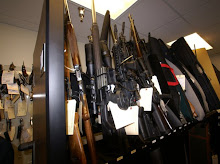
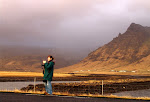



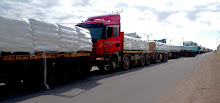
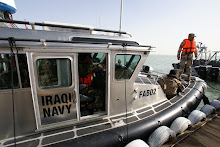

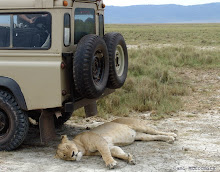
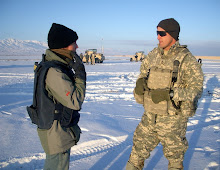



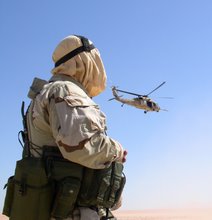
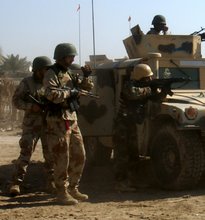
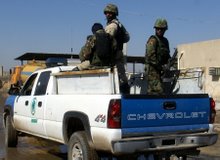
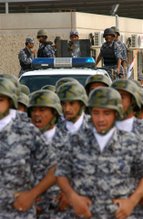
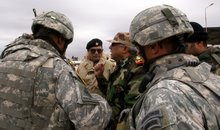
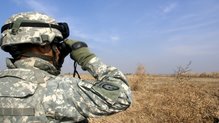
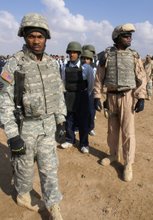


No comments:
Post a Comment